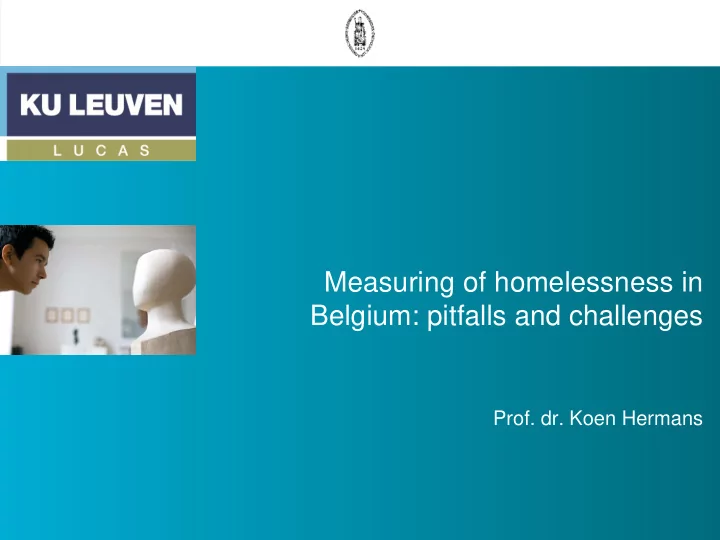

Measuring of homelessness in Belgium: pitfalls and challenges Prof. dr. Koen Hermans
Belgian homelessness policies Federal level : – Social assistance – Health care (including mental health care) Regional level : – Housing policies (including housing measures for vulnerable groups) Communal level: – Welfare services (including residential services and floating support) Local level : – Night shelters and winter plans – Implementation of social assistance Complex division of competencies impedes coherent monitoring strategy
3
Baseline measurement in 2014 in Flanders Starting point : ETHOS Method : – Additional registration in services by social workers Category 1 and 2 : – Unique users of 11 winter shelters during two weeks in january – Amount of refusals Category 3: – Characteristics of users of residential services – Characteristics of users of transitional supported accomodation Category 9 – Characteristics of persons with an eviction claim
Measurement difficulties Category 1 & 2 : – Inclusion criteria of shelters differ – Night shelter is last solution (based on participant observation in shelters) – Regions without winter plans (rural areas) – Hidden homelessness (‘couch sleepers’) – Reluctance to measure in winter shelters Category 3 & 4: – Questionnaires filled in by social workers and users – Only stock data
MEHOBEL: measuring of homelessness in Belgium 2-year research project financed by BELSPO Policy-oriented goal: development of Belgian monitoring strategy Scientific goals: – ‘Static’ definition of ETHOS vs ‘homeless trajectories’ – Definition and measurement of ‘hidden homelessness’ – Relevance of the use of available administrative (social security) data and linking of administrative databases – Street counts vs capture-recapture methods ? – Different methods different results and measurement errors
Scientific challenges Goals measurement strategies – The amount of homeless persons – The characteristics and trajectories of homeless persons – The way policies shape homelessness – Monitoring of the effectiveness of a national or local homelessness strategy European coordination and streamlining of measurement strategies Participation of users in measurement strategy
Recommend
More recommend